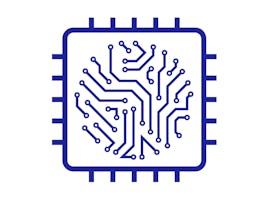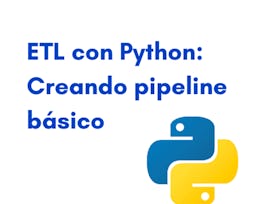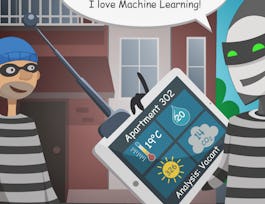This course is aimed at anyone interested in applying machine learning techniques to scientific problems. In this course, we'll learn about the complete machine learning pipeline, from reading in, cleaning, and transforming data to running basic and advanced machine learning algorithms. We'll start with data preprocessing techniques, such as PCA and LDA. Then, we'll dive into the fundamental AI algorithms: SVMs and K-means clustering. Along the way, we'll build our mathematical and programming toolbox to prepare ourselves to work with more complicated models. Finally, we'll explored advanced methods such as random forests and neural networks. Throughout the way, we'll be using medical and astronomical datasets. In the final project, we'll apply our skills to compare different machine learning models in Python.


Machine Learning Models in Science
This course is part of AI for Scientific Research Specialization
Taught in English
Some content may not be translated



Instructors: Sabrina Moore
Included with 
Course
(10 reviews)
Recommended experience
What you'll learn
Implement and evaluate machine learning models (neural networks, random forests, etc.) on scientific data in Python
Details to know

Add to your LinkedIn profile
5 quizzes
Course
(10 reviews)
Recommended experience
See how employees at top companies are mastering in-demand skills

Build your subject-matter expertise
- Learn new concepts from industry experts
- Gain a foundational understanding of a subject or tool
- Develop job-relevant skills with hands-on projects
- Earn a shareable career certificate


Earn a career certificate
Add this credential to your LinkedIn profile, resume, or CV
Share it on social media and in your performance review

There are 4 modules in this course
In this module, we'll tackle the steps taken before we can use AI algorithms. We'll start with an introduction to the most prominent data preprocessing techniques including filling in missing values and removing outliers. Then we'll dive into data transformations including PCA and LDA, two methods featured heavily for dimensionality reduction. Finally, we'll learn how to code the algorithms in Python to set up your data for use in the next module.
What's included
12 videos4 readings2 quizzes1 discussion prompt
In this module, we'll dive into two of the most foundational machine learning algorithms: K-Means and support vector machines. We'll start by comparing the two branches of ML: supervised and unsupervised learning. Then, we'll go into the specific similarities and differences between K-Nearest neighbors for classification and K-Means clustering. Finally, we'll perform deep dives into K-Means and SVMs, learning the basic theory behind them and how to implement each in Python.
What's included
4 videos3 readings2 quizzes1 programming assignment1 discussion prompt2 ungraded labs
In this module, we'll explore some advanced AI techniques. We'll start with tree-based algorithms, made popular because of the use of random forests for both classification and regression. Then, we'll build our way to neural networks, starting from experimentation on the different models. We'll spend some time in the Tensorflow playground getting familiar with the different mechanics behind neural networks. Finally, we'll code our own neural networks to make predictions on unseen data.
What's included
1 video4 readings1 quiz1 programming assignment1 discussion prompt2 ungraded labs
In this module, we'll go through a course project to predict diabetes from health data. We'll compare different regressors by implementing them and checking the error on a test set.
What's included
1 programming assignment1 ungraded lab
Offered by
Recommended if you're interested in Machine Learning

LearnQuest

Coursera Project Network

Coursera Project Network
Why people choose Coursera for their career




Learner reviews
Showing 3 of 10
10 reviews
- 5 stars
40%
- 4 stars
10%
- 3 stars
40%
- 2 stars
10%
- 1 star
0%
Reviewed on Jul 7, 2022
New to Machine Learning? Start here.

Open new doors with Coursera Plus
Unlimited access to 7,000+ world-class courses, hands-on projects, and job-ready certificate programs - all included in your subscription
Advance your career with an online degree
Earn a degree from world-class universities - 100% online
Join over 3,400 global companies that choose Coursera for Business
Upskill your employees to excel in the digital economy
Frequently asked questions
Access to lectures and assignments depends on your type of enrollment. If you take a course in audit mode, you will be able to see most course materials for free. To access graded assignments and to earn a Certificate, you will need to purchase the Certificate experience, during or after your audit. If you don't see the audit option:
The course may not offer an audit option. You can try a Free Trial instead, or apply for Financial Aid.
The course may offer 'Full Course, No Certificate' instead. This option lets you see all course materials, submit required assessments, and get a final grade. This also means that you will not be able to purchase a Certificate experience.
When you enroll in the course, you get access to all of the courses in the Specialization, and you earn a certificate when you complete the work. Your electronic Certificate will be added to your Accomplishments page - from there, you can print your Certificate or add it to your LinkedIn profile. If you only want to read and view the course content, you can audit the course for free.
If you subscribed, you get a 7-day free trial during which you can cancel at no penalty. After that, we don’t give refunds, but you can cancel your subscription at any time. See our full refund policy.


